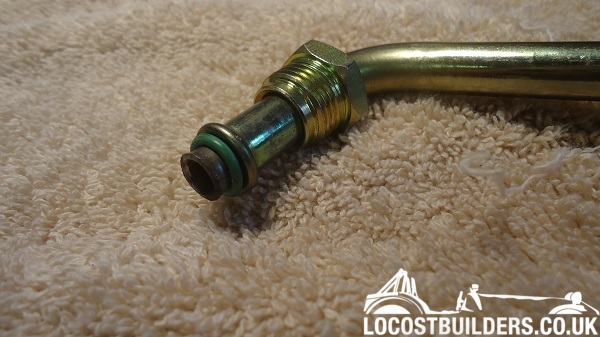Mr Whippy
|
| posted on 3/11/17 at 12:24 PM |

|
|
What's this fitting type called?
Hi,
Can someone identify the fitting type here? it seems a very common power steering type and I have one very similar but need a replacement o-ring (lost
the original) and need to look up the spec.

Thanks
|
|
|
|
|
Dingz
|
| posted on 3/11/17 at 02:03 PM |

|
|
Used to deal with this sort of thing before I retired, not sure of the name but the O ring material is probably HNBR.
Phoned the local ramblers club today, but the bloke who answered just
went on and on.
|
|
|
Mr Whippy
|
| posted on 3/11/17 at 02:16 PM |

|
|
ok thanks I'll keep that in mind
|
|
|
owelly
|
| posted on 3/11/17 at 03:18 PM |

|
|
Try swivel O-ring flare.
http://www.ppcmag.co.uk
|
|
|
motivforz
|
| posted on 3/11/17 at 06:39 PM |

|
|
If you measure the diameter of the o-ring, and the diameter it seats on, I can find a catalogue size for you if you like?
|
|
|
nick205
|
| posted on 4/11/17 at 08:17 AM |

|
|
If it's a power steering fitting then make sure whatever you use is resistant to power steering fluid!
I'm sure you know that anyway, but since I don't know the name of the fitting I thought I'd add it.
|
|
|
snapper
|
| posted on 4/11/17 at 08:56 AM |

|
|
quote:
Originally posted by Dingz
Used to deal with this sort of thing before I retired, not sure of the name but the O ring material is probably HNBR.
More regularly know as Nitrile
I eat to survive
I drink to forget
I breath to pi55 my ex wife off (and now my ex partner)
|
|
|
Mr Whippy
|
| posted on 4/11/17 at 01:21 PM |

|
|
quote:
Originally posted by motivforz
If you measure the diameter of the o-ring, and the diameter it seats on, I can find a catalogue size for you if you like?
Sadly I don't have the original o ring any more i went on the incorrect assumption it would be easy to replace and didn't put it safely
aside
|
|
|
Dingz
|
| posted on 5/11/17 at 06:53 PM |

|
|
Nitrile is NBR, Nitrile Butadiene Rubber, ok for about 90°C
HNBR is Hydrogenated Nitrile Butadiene Rubber, which is good for just shy of 150°C, you could see temperatures of around 120 in a power steering
system. If desparate you could try Viton which is FKM a Fluoroelastomer which will be fine for the high temperature but could leak at about -10°C.
Phoned the local ramblers club today, but the bloke who answered just
went on and on.
|
|
|
motivforz
|
| posted on 5/11/17 at 08:12 PM |

|
|
okay - can you measure the shaft it fits on, and the bore it sits in? I could have a pretty good guess what size it should be from those two numbers.
Viton or nitrile as above would be the likely candidates.
I'm curious about the viton being no good for below -10°C, is this a shrinkage issue or brittleness or something else? I've used viton for
a variety of ambient applications and not had an issue, although they're replaced regularly. My only concern with Viton is the effect of fire
damage - it turns into a pretty corrosive substance.
|
|
|
Dingz
|
| posted on 5/11/17 at 11:24 PM |

|
|
The elastomers generally shrink slightly with low temperatures but critically they loose their elasticity, become solid and not exert any sealing
force. The material spec will have a figure known as Tr10 which is the temperature below which the compound will not necessarily seal. It is a measure
of its residual elasticity. There are specialised low temperature Vitons which would go down to something like -30.
The terrible example of low temperature failure was the Challenger Shuttle launch, those O rings were perfluoroelastomers which have a temp range of
roughly +300°C but probably a low end of about +5°C.
Sorry for the lesson and back to the original question, its a shame you haven't the old part, if it's a Nissan part its probably a
Japanese standard size. Is there a similar fitting in the system? if so carefully measure the id of the O ring and even more carefully the cross
section to try and find the correct one.
Phoned the local ramblers club today, but the bloke who answered just
went on and on.
|
|
|
coyoteboy
|
| posted on 6/11/17 at 01:55 AM |

|
|
quote:
Originally posted by motivforz My only concern with Viton is the effect of fire damage - it turns into a pretty corrosive substance.
http://www.hse.gov.uk/mvr/topics/fluoroelastomers.htm
|
|
|













